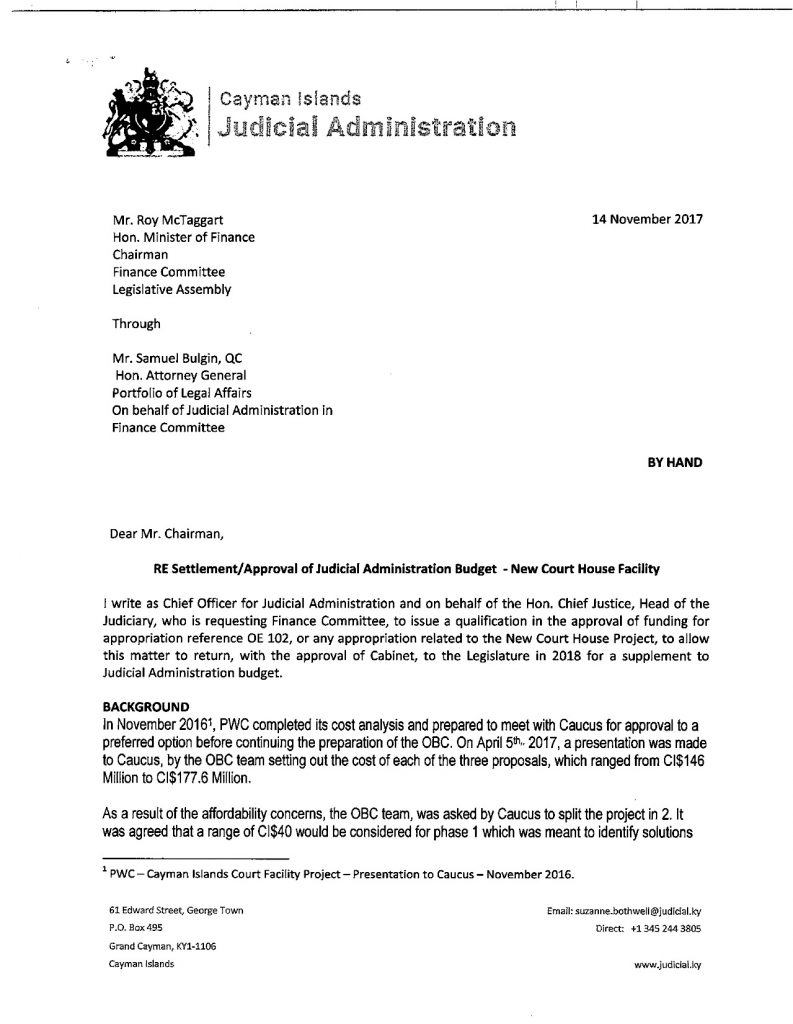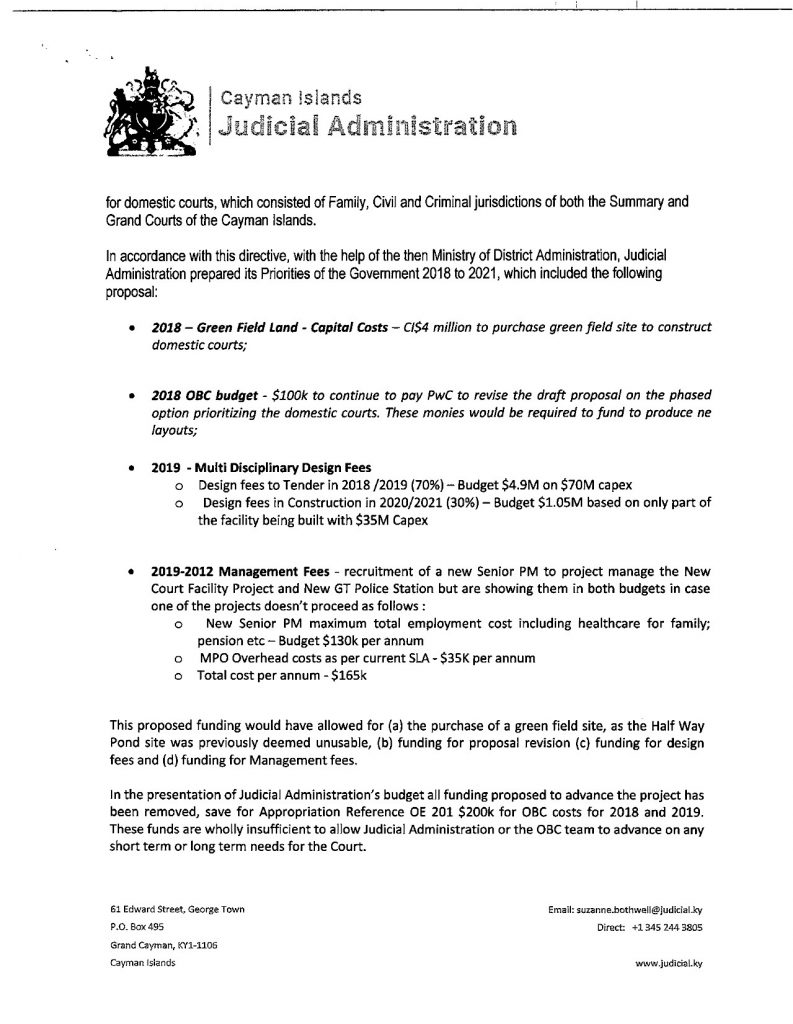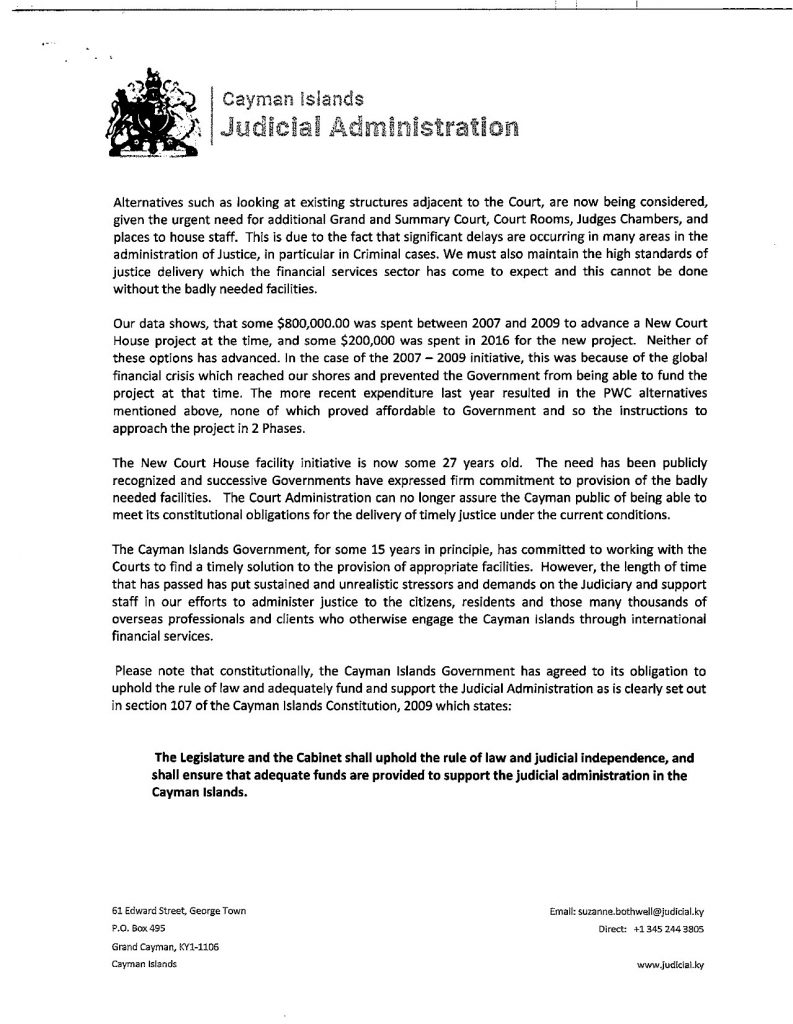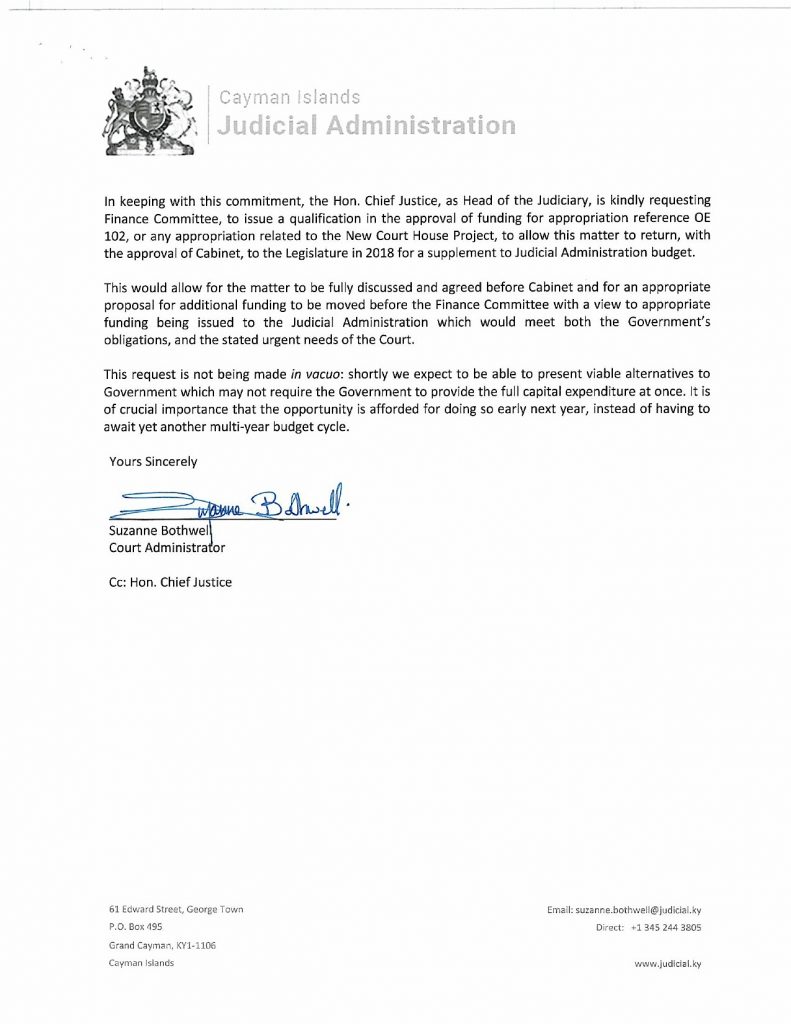The Chief Justice’s Report to the opening of the Cayman Islands Grand Court, 17th January 2018
 The proceedings commenced with Prayers led by Pastor Dr. Randall Von Kanel of the Cayman Islands Baptist Church. Salutations were extended to Her Excellency the Governor, the Hon. Premier, the Deputy Governor and other Honourable Members of Cabinet, Honourable Members of the Legislative Assembly, The Commissioner of Police and other distinguished guests. Thanks,first of all were expressed to Pastor Randy (as he is affectionately called) for having led the gathering in prayer.
The proceedings commenced with Prayers led by Pastor Dr. Randall Von Kanel of the Cayman Islands Baptist Church. Salutations were extended to Her Excellency the Governor, the Hon. Premier, the Deputy Governor and other Honourable Members of Cabinet, Honourable Members of the Legislative Assembly, The Commissioner of Police and other distinguished guests. Thanks,first of all were expressed to Pastor Randy (as he is affectionately called) for having led the gathering in prayer.
The Chief Justice then expressed special appreciation to Her Excellency the Governor for her support of the judiciary and, in particular her support for the Constitutional Amendment 2016 which was crucial for the full restoration of the principles of judicial independence and security of tenure. Noting that this will be Her Excellency’s final appearance, at least in her official capacity, at an Opening of the Court, he thanked her for all the good work she did as Governor of the Islands, during her very significant term of office.
The Chief Justice then invited the Hon. Attorney General, followed by Mr. Alasdair Robertson of the Cayman Islands Law Society, Mr.Stephen Watler of the Caymanian Bar Association, and Mr. Colin McKie QC on behalf of the editors of the Cayman Islands Law Reports; to move and support the motion for the opening of the Court.
The Chief Justice responded in turn to each Mover and then presented the following report:
REPORT TRANSITIONS
As in previous years, I begin with reflections on the changes or transitions occurring within the Judiciary and staff of the Administration.
The Judiciary
First, allow me to welcome Justice Kawaley on this the occasion of his first sitting at an opening of the Court. Justice Kawaley commenced as a permanent member of the Court last year, assigned to the Financial Services Division. We look forward to him being able to preside here more regularly after he demits office as Chief Justice of Bermuda in mid-2018.
At the opening of the Court in January last year, we announced Justice Jones retirement and there were fulsome expressions of gratitude for his immense contributions to the development of the law of the Islands, both as a legal practitioner and as judge of the FSD. As it happened however, the demands of his cases meant that Justice Jones had to continue to sit at various times throughout the year, concluding, finally he tells me, at the end of December.
Allow me then once more, to extend our thanks to Justice Jones for his sterling service to the courts and to the jurisdiction as a whole. We wish him a long and enjoyable retirement, and continued success in any other area of endeavor he might undertake to animate his retirement.
I also wish to extend our thanks to Acting Magistrate Nervik for the excellent contribution she has made and continues to make as magistrate in the summary court and in particular, for the tremendous work she has done as Coroner, in clearing the backlog in the coroner’s court.Magistrate Nervik demits office in June of this year.
Acting Judges
Last year also marked the end of tenure of some of our acting judges who reached the constitutional age limit of 70. Allow us to thank Justices Seymour Panton, Malcolm Swift (who is here today), Michael Mettyear, Alistair Malcolm and Paul Worsley for their important contributions to the administration of justice here, especially on the criminal division. As I report each year, it simply would be impossible to cope with our work load without the support of the judges who serve from our Acting List.
At the same time, allow me therefore also (as did the Hon. Attorney General) to welcome Justice Marlene Carter who has been sitting regularly as an Acting Judge since last year, this being her first appearance in her capacity as an Acting Judge at an Opening of the Court.
Transitions within the Administration
Soon later this year, we will also bid farewell to Mrs. Audrey Bodden, a senior and veteran member of staff. Miss Audrey, as she is affectionately called, served within the Administration in important legal posts as Deputy Clerk of Court and as Registrar of the Court of Appeal. This was after having served as an officer of the Dept. of Social Services for a number of years. We thank Miss Audrey for her many years of invaluable service and wish her all the best for her retirement.
We also note the intended departure later this month of Tanya Meyerhoff – Case Manager for the Family Division; and Lorin Williams, Executive Officer, Criminal Registry. Tanya Meyerhoff’s responsibilities as Case Manager on the Family Division, will be carried on by Terryanne Iton who joined the Division in July last year.
Finally on the subject of personnel transitions, I am pleased to note the appointments to three very important offices and extend once more our welcome and congratulations to the appointees. Mrs. Shiona Allenger was appointed Clerk of Court with effect from 1st June 2017.
Miss Jenesha Simpson, as Senior Deputy Clerk of Court and as Registrar designate of both the Court of Appeal and the FSD, with effect from 1st July 2017. Miss Stacy Parke was appointed Legal Aid Director, with effect from 17th August 2017 and I welcome Mr. Watler’s recognition of this important appointment and commitment to support Ms. Parke in the operation of the Legal Aid Clinic to be established.
As many of you would know, these are posts which must by law, be filled by persons having legal qualification and experience and I am pleased to note that each of these ladies joined the administration having had significant practical experience within the Islands.
We of course wish them every success as they undertake their demanding duties and urge especially the members of the profession to give them your support and co-operation.
Interns and Judicial Clerks
Our now well established internship programme continued apace last year when we accommodated 16 new interns from different backgrounds, including 6 at University level. Intern Bryanna Davis was recognised by the Portfolio of the Civil Service as an Outstanding Intern, for displaying a strong commitment to her duties at the Judicial Administration.
This brings the number of interns employed since 2013 to 69. Last year also saw the successful introduction of the Judicial Clerkship programme, sponsored in conjunction with the Profession through the CILS and CBA. Two very impressive trainee lawyers, Erin Panton and Yannick Whorms each spent 4 weeks of their articles shadowing judges and magistrates and becoming familiar with the workings of the Court Registries.
Justice Williams, who oversees the program and collates the assessments, tells me that he was very pleased with the aptitude and dedication of the Clerks.
LEGAL AID
Since she assumed office, many issues arising for the implementation of the new Law (the Legal Aid Law 2015) have been raised by the Director and I have met with her and the Court Administrator for their resolution. The Director’s first report on the work of her office will be published along with this report.
Of particular note, she reports that:
1. The active list of legal aid attorneys comprise
Civil and Family Practice ␣ 46; ␣
Criminal practice ␣ 29; ␣
Duty Counsel- 23.
2. In 2017, the number of Criminal Legal Aid Applications received was 353. The number granted was 284 (not including applications and grants for extension of certificates).
3. In 2017, the number of Civil/Family Legal Aid applications received was 302. The number granted was 190 (not including applications and grants for extension of certificates).
4. From the figures provided by the Accounts Department, the amount paid out for legal aid matters in 2017 (including Q.C. fees, expert fees and reports, etc.) was $2,845,813.18.
E-FILING
Upgrade to the Judicial Database which is called JEMS AMANDA is near completion. Features of the new database will allow clients to file and monitor their cases, and to pay relevant fees online. A pilot will commence in March in the Financial Services Division to test the Electronic Filing system, whereby attorneys (and ultimately private litigants in person) may file proceedings from the comfort and convenience of their homes or offices. A number of firms both large and small, along with representatives of the Finance Users Committee have agreed to participate in the pilot. These include:
o Ogiers
o Carey Olsen
o Maples and Calder
o Walkers
o Deloitte
o Grant Thornton Cayman Islands
o CIMA
o Cayman Finance
o KSG Law
o Samson Law
o Broadhurst
A similar initiative will be launched in the Criminal Division later this year, along with APEX CURIA, to facilitate electronic filings by the Director of Public Prosecution, the RCIPS, attorneys, and other stakeholder government departments. This platform will also allow for enhanced case management of criminal files, greater synergies between the parties in criminal cases, and provides modern tools for the judiciary to manage their cases, and to perform their relevant judicial functions. The Court is embarking on these initiatives to bring about greater efficiency to the administration of justice, to allow litigants in person to have greater access to justice and control over matters, and to allow for greater synergies between parties as it relates to pre-trial preparation, service of documents, and ultimately increased use of electronic materials during the trial process.
CASE DISPOSAL
While we disposed of 104 indictments last year (coincidentally with 104 new indictments filed), the large number of indictments carried over from year to year has become a chronic problem. 100 indictments were carried over from 2017 (14 of these being the subject of arrest warrants). This is a clear indication of the stress under which the justice system is being forced to operate because of the lack of proper court facilities. The same is true of criminal case disposal in the summary courts. Trials in the summary courts have to be postponed with alarming regularity because of the unavailability of courtrooms and so 674 criminal charges were carried over from 2017.
The result is that justice is being delayed for persons facing criminal charges and we are at the stage where this kind of delay becomes tantamount to denial of justice.
For this reason, I will not follow the usual format this year of discussion in detail of the statistics on case disposal. Given the prevailing circumstances which I will describe in more detail below about the Court Building project, such a report it seems to me, would be an exercise in futility. It is pointless discussing matters such as the rate of case disposal for the sake of reassuring the public that we can deliver justice in a timely fashion, while knowing that there are no plans in place which will allow us to continue to do so.
Instead, I will make the focus of my report this year once more about the need for the facilities. Neither the Government nor the public should be in any doubt what the consequences will be if we continue to fail to provide adequate court facilities. My Report will be published immediately following these proceedings along with the statistics on case intake and disposal which will speak for themselves.
A Report prepared by Chief Magistrate Nova Hall on the work of the Summary Courts will also be published along with and incorporated as a part of this Report. You will see the heightened concerns about the sad state of the court facilities expressed from the point of view of life in the Summary Courts. Like with the Grand Court, the problem is not lack of judicial or administrative capacity, it is lack of courtrooms for the trial of cases.
Her report also includes results on the work of the Drug Rehabilitation Court, the Mental Health Court and the other diversionary programs.
And so I come once more to the subject of the court building. For nearly three decades successive governments have accepted the need for improved court facilities and expressed commitment to providing them. For at least half of that time, over the last 15 years, successive governments have budgeted in one way or another for the development of a new Court House. And significant sums have been spent, upwards of a million dollars, for the presentation of the formal business case, the preparation of architectural and engineering drawings, site acquisition and planning approval.
This budget year has seen a startling change of course. With the Government committed to some $300 million for capital expenditure over the next two years, none of that has been allocated to the Courts.
On the contrary, a sum of $4 million requested in our budget for land acquisition for the location of a building was removed without any explanation being offered. In light of the exorbitant sums estimated by PWC as the cost of any of the three proposals identified by them in 2016, our intention was to propose the development of the 2008 design on a site to be acquired within the environs of George Town. In a final bid to ensure that such a project might be progressed over the next two years, the Court Administrator wrote at my request to the Minister of Finance as chairman of the Finance Committee, asking that the position may be reserved when the budget was being debated in November last. The letter also set out the background history of the project and once more emphasized the urgent need for the building. Despite the fact that a copy of this important letter was also sent to the Hon. Premier for Cabinet’s consideration, no response has been received and no reservation to the budget was made as requested, in order to allow the matter to return to Finance Committee over the next two years.
This new and sudden demonstration of indifference by Government can at best be seen as a failure to understand the true nature of the difficulties confronting the Administration, as we struggle from year to year to ensure that people receive timely justice.
After being assured for many years that the Government understands the needs and was committed to addressing them, I find myself now having to make the case once more for the benefit of Government and the public.
I begin by reading into the record our letter addressed to the Chairman of the Finance Committee copied to the Hon Premier and to which a response is still awaited.
[LETTER READ].
The present situation betrays a lack of vision. Apart from the ramifications for the delivery of justice to our local public to which I will return below, the present situation suggests a lamentable lack of appreciation for the importance to Cayman of the Courts␣ ability to resolve, in a timely manner, the hundreds of complex international cases coming before our FSD each year.
Last year alone 286 such cases were filed. Unreasonable delay in the adjudication of any one of these cases could result in serious impairment to the reputation of the Islands as a leading financial center. I emphasize again this year how very real that potential embarrassment is becoming. I mention but two recent examples. While the year-long trial of the AHAB case was widely publicized for all its complexity and size, what has not been publicized is the fact that the court room had to be fitted out at considerable expense to the parties themselves in order to accommodate the large number of representatives and the technical equipment for the presentation of the evidence.
In another very valuable case, I had to agree, in order to allow the trial to proceed, that the parties should rent a conference room at the Marriott Hotel and fit it out at their expense. While all sides were ready for trial and Justice Segal ready and keen to try the matter, we would otherwise have had no courtroom available for the trial. A postponement would have meant months of delay at great cost to the parties and waste of valuable assets in the meantime.
These cases are not examples of the way a modern court system should be expected to operate. Modern court rooms capable of accommodating complex trials are now standard facilities in many of our competing jurisdictions. There are anecdotal accounts of professionals who appear here as well as in Singapore, Hong Kong, New York and London expressing disbelief at the state of our court facilities by comparison to those available in these competing jurisdictions. They fairly describe our court facilities as “shabby, cramped and wholly inadequate”.
We must not fail to appreciate that the judiciary and the courts are pivotal for our system of justice and are crucial to the international reputation of the Islands. A main reason why people chose to do business within the Islands is its judicial system’s reputation for independence, integrity, incorruptibility and yes, efficiency as well. When hundreds of millions or even billions of dollars worth of assets are at stake, inefficiency and its resultant delay become intolerable.
Without in the slightest overstating the position, that is exactly the outcome soon to become the norm, unless the current attitude of governmental neglect is reversed.
I conclude on this subject by returning to the state of accommodations for the administration of justice at the domestic level.
We run courts all day and every day in the Grand and Summary Courts. But cases cannot go ahead in both the Grand Court and the Summary Court simultaneously because of the lack of courtrooms. This is inevitably exacerbated whenever the Court of Appeal is in session. The result, as the Chief Magistrate explains, is that: ␣
The scheduling of matters often collapsed, because there were insufficient court rooms in which the matters could be listed. There has tended to be last-minute convergences of two court lists before one magistrate. Otherwise, two magistrates have had to share one courtroom, staggering the times that each starts. Naturally, most matters are then adjourned. For over a decade, the Summary Courts could proudly state that they could schedule trials on an emergency basis within days or at most a few weeks, of a first appearance. This is essential when dealing with persons on remand (in custody) and often when dealing with persons with no permanent ties to the Islands, (such as immigration offenders). We will still try to prioritize these matters but obviously, all other matters will be delayed for (lack of courtrooms to take them in); and in some cases for quite a few months␣.
Needless to say, such long delays are anathema to all notions of justice in a court of summary jurisdiction. But there is simply no hope of avoiding them without more courtrooms.
Another sign of the cramped conditions is that bail applications in chambers must now often be taken in the small library room and in order to avoid delay and the unjustified denial of liberty, applications must now also be taken at lunch time in the judge’s chambers, a time which, obviously should be available for repast and reflection.
Nor may concerns about personal security be overlooked. Judges, magistrates and court staff are forced to deal with cases involving reputedly violent (in custody) defendants in courts 3, 4, 5 and 7 which were never designed for serious criminal cases. When a case is taken in Court 4, there have been occasions due to the weather when the defendant, jury, court staff and judge all enter and exit by the same door, unavoidably “cheek by jowl”.
I take this occasion to remind government of the serious risks to personal security which are attendant upon the administration of criminal justice in today’s world. These are risks which cannot be adequately addressed unless and until we have the necessary court facilities.
My fervent hope [expressed directly to the Hon Premier and other members of Government as I note their presence with us here today] is that we will receive a positive response from Government to this report in order that we may resume planning immediately for the long overdue and crucially needed facilities.
JUSTICE REFORMS,
The Criminal Justice Reform Committee last year completed the Cayman Islands Sentencing Guidelines on Money Laundering which were published in October 2017. There is a first draft now being reviewed by the CJRC of the Death by Driving Sentencing Guidelines which are expected to be published by June 2018. Justice Quin, as chairman of the CJRC, has asked me to extend our thanks to all the volunteers who serve on the CJRC for their fine and dedicated work. Members include representatives from the Office of the DPP, the Defence Bar, the Royal Cayman islands Police Service, Her Majesty’s Prisons Service, the Probation Department and the Truman Bodden Law School.
The Criminal Division Grand Court E-Mail Weekly Diary.
This integrated annual spread-sheet form electronic court diary is now fully operational and has received encouraging comments from all its many users. It colour codes, highlights and co-ordinates the fixtures for indictment trials using key headings such as “Jury/Judge Alone Trials”, “Custody Defendants”, “Child Sex Defendants”, Retrials”. The diary is sent out weekly to the Crown’s law offices, the Defence Bar, Director of Prisons, Dept of Family and Children Services, Probation Officers, the RCIPS and all others involved in the Grand Court Criminal process. Justice Quin reports, as the case management judge of the Criminal Division, that despite the constraints of lack of court rooms, last year we continued to avoid gridlock by disposing of more indictments than were filed during the year. This is borne out by the statistics even while they tell the story of justice delayed being justice denied: 104 new indictments were filed with 100 carried over to 2018.
JUDICIAL OUTREACH AND CONTINUING EDUCATION
Last year we were honoured to have Lord John Thomas, the Lord Chief Justice of England and Wales as our distinguished Guest Lecturer. His interesting and thought provoking lecture on the topic of the importance of Commercial Courts was very well attended. The profession showed its appreciation for the visit of Lord and Lady Thomas by hosting a memorable gala event at the Marriott Hotel.
International Co-operation
The business of mutual legal assistance continued apace last year with a number of requests considered and processed by the Chief Justice as Mutual Legal Assistance Authority under the CAYMAN/US MLAT, with the fine assistance of counsel from the DPP’s Office. A number of applications were also taken by the Grand Court pursuant to the Criminal Justice (International Co-operation) Law.
In closing, we join with the movers in their expressions of condolences to their families and appreciation for the lives of the dear departed Justice Kipling Douglas, Attorneys Julene DaCosta-Ebanks, Richard DeLacy QC and Julian Black.
On behalf of all of us here at the Courts we wish for you and your families all the best for the New Year.
[As ever, we are very appreciative of the symbolic support presented by the officers of the RCIPS on parade and ask the Commissioner to convey our thanks to his men and women in uniform].
I thank the movers once more for all their insightful and informative comments. I am pleased to accede to their motion for the opening of the business of the Courts for the year 2018 and extend our customary invitation to all to join us in the foyer for refreshments [and the presentation of a gift or two] before returning to your busy schedules.
Hon. Anthony Smellie
Chief Justice 17 January 2018.
Grand Cayman.
END
See attached LETTER TO ROY MCTAGGART referred to in the above.









